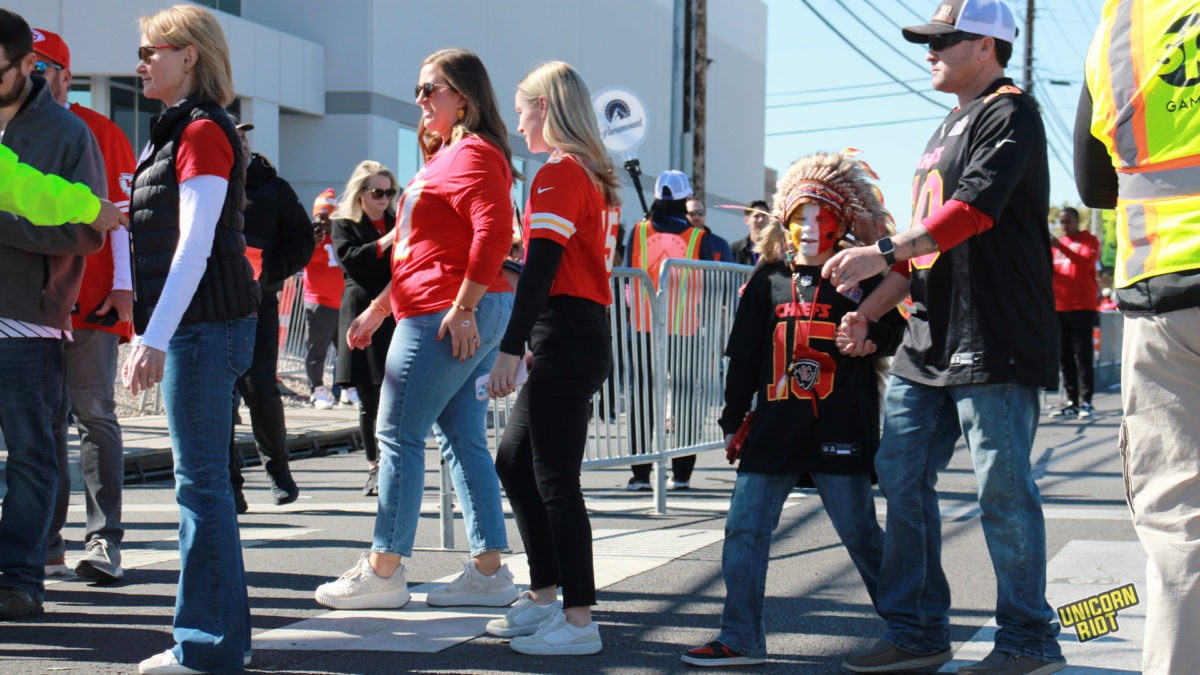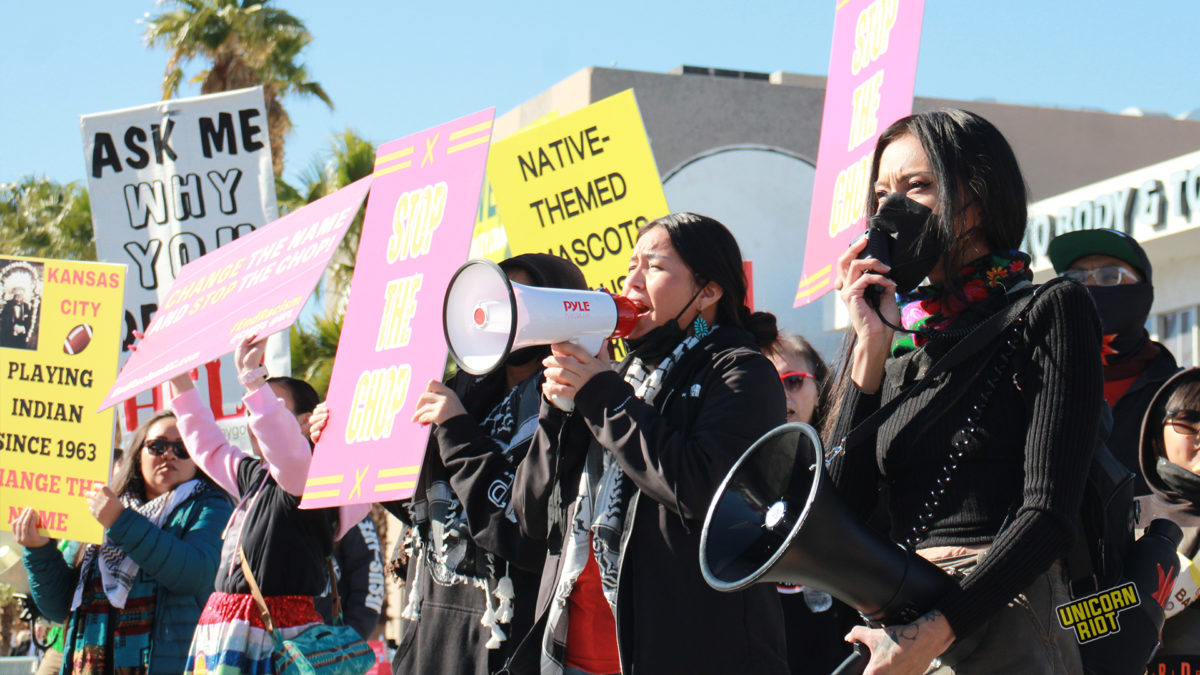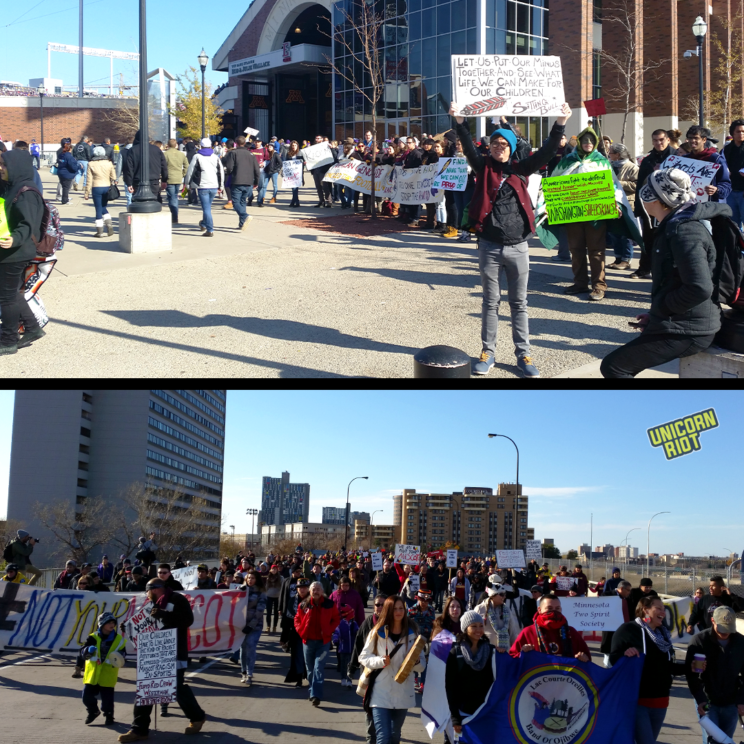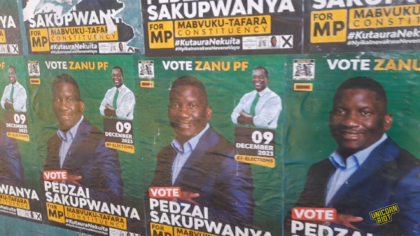Kansas City’s Return to Super Bowl Brings Protest Against Continued Use of ‘Chiefs’
Las Vegas, NV — When Kansas City returned to the Super Bowl on February 11, a group of Native people returned their protest against the continued use of the “Chiefs” and behavior by its fans. Nearly 30 people held signs that read “Kansas City – Promoting Harmful Stereotypes Since 1963 – Change the Name,” “Stop the Chop,” and “Change the Name and Stop the Chop!” near one of the entrances to Allegiant Stadium in Las Vegas, where National Football League teams Kansas City Chiefs and San Francisco 49ers played in Super Bowl LVIII.
It is the second consecutive year and three out of the last four years that Kansas City has been in the Super Bowl, and many continue to voice their disapproval of the team’s name, imagery, and behavior.
[2023 COVERAGE] Indigenous People Demonstrate at Super Bowl Demanding Kansas City Drop its Team Name ‘Chiefs’
As thousands of people walked to the entrance of the Super Bowl, they heard, “Stop the chop! Change the Name! Stop Cultural Appropriation!” from a group of largely Native women. Some Kansas City fans angrily confronted some of the protestors, yelling to “get a life” and “go back where you came from” and others mimicked the “tomahawk chop,” an act many say is racist and must stop. Some approached the group and asked questions, leading to some joining the protest.
“I’m here to raise awareness about cultural appropriation by the Kansas City football team, and make sure that people know that Native people don’t appreciate it,” said Rhonda LeValdo to Unicorn Riot. LeValdo flew to Las Vegas to participate in the press conference and helped organize Sunday’s protest. LeValdo is a former professor of journalism at Haskell University in Lawrence, Kansas and also leads Not In Our Honor, a coalition of Native organizers who advocate against the use of Native American imagery in sports.
The protest was organized by the local Las Vegas Native community, where the day prior to the Super Bowl, Not In Our Honor, the Kansas City Indian Center and Arizona Rally to End Native Mascots hosted a press conference at the Nuwu Art Gallery + Community Center. Leaders denounced the continued use of the “Chiefs” name and fan behavior such as the “tomahawk chop,” the use of a “big drum” and its imagery.
Leaders say behavior by Kansas City fans is cultural appropriation and racist and want the National Football League to end the use of race based mascots.

The “Chiefs” mascot name came from the nickname of H. Roe Bartle the former Mayor of Kansas City who had created a cosplaying boy scout group called “Tribe of Mic-o-Say” in the 1920s. In 1962, Mayor Bartle convinced the owner of the Dallas Texans and creator of the term “Super Bowl,” Lamar Hunt of the oil tycoon Hunt family, to move his football team to Kansas City. Hunt then changed the name to the “Chiefs” in honor of Bartle.
“I’m here as a person and this is a human issue,” said Fawn Douglas, a citizen of the Las Vegas Paiute Tribe in an interview with Unicorn Riot. “We’re hoping to reach a large base of people that are still continuing this racist stereotype of the ‘tomahawk chop’ and the ‘Chiefs’ name. As a local Indigenous woman, I am against this and I feel like we could be enjoying sports, too.”
The “tomahawk chop” is a sports celebration not unique to Kansas City. It’s a synchronized rally cry that mimics a chopping motion, with an open hand being the tomahawk, or a type of hatchet used by many Indigenous people prior to trading with Europeans. It is also celebrated by Florida State University Seminoles and Atlanta Braves fans, where they all sing a wordless “war chant” while conducting the chop at games. The chop is so popular in Atlanta that a foam tomahawk also accompanies the chop.
It is unclear when the chop was invented, but Florida State University has claimed credit as the inventors of the chop, when its marching band—the Marching Chiefs—adopted it to complement their war chants in the 1980s. Many have called for the abolishment of the “tomahawk chop” chant at all sports venues and any and all Native American appropriation that occurs within the Kansas City franchise and in football stadiums.

“IllumiNative stands with the Native Community and local organizers in Kansas City and Las Vegas calling on the Kansas City Chiefs to change their name, retire all derogatory imagery associated with Native peoples, and eradicate racist fan behavior like the ‘tomahawk chop’ at their games,” said IllumiNative President Michael Johnson in a statement to Unicorn Riot.
IllumiNative is a Native-women led organization that was founded in 2018 to empower Native people, and to raise awareness of Native invisibility and erasure in mainstream society.
“Native mascots and imagery are profoundly damaging–many research projects have found that the perpetuation of negative stereotypes about our people dehumanize our heritage and harm the self-esteem of our youth,” said Johnson, who is also a citizen of the Three Affiliated Tribes of North Dakota (MHA Nation).
“Native peoples, Tribal Nations, National Organizations and others have been calling for change for decades, and we are so grateful to the leaders of this movement like Suzan Harjo for proving with the Cleveland Guardians and Washington Commanders that change is possible. There is no excuse for Kansas City and the rest of the sports world, and we will continue to advocate until the NFL, MLB, NHL, collegiate, and K-12 sports end all use of Native sports mascots, names, and imagery and ban racist fan behaviors.”
Suzan Harjo, who led a lawsuit with seven other plaintiffs against Pro-Football, Inc. (the corporation that owned the Washington Redskins), said in a statement to Unicorn Riot: “It’s vital to achieving justice that we call attention to injustice. We don’t do it to remind our opponents that we are not going away—they know that—but to assure our own Native Peoples and our friends that we are who we’ve always been and aren’t changing our minds or selling out.”
Harjo is a Cheyenne and Hodulgee Muscogee advocate who received a Presidential Medal of Freedom from President Barack Obama in 2014 for her advocacy for Native cultural rights. She challenged the United States Patent and Trademark Office’s Trademark Trial and Appeal Board (TTAB) to cancel the registration of the Washington Redskins football team by claiming that the name was disparaging to Native Americans. TTAB granted the petition, but the appeals court overturned the cancellation, saying that laches applies, where the court said that defendants waited too long to make a claim of disparagement. The name “Redskins” is defined in the dictionary as a racial slur aimed at Native Americans. Washington retired its name on July 12, 2020, after some of its sponsors, including Nike removed Washington apparel from its website.
The decision was celebrated by many, and Native leaders in Minnesota hosted a press conference at the Minneapolis American Indian Center calling the name change long overdue. One of the founders of the American Indian Movement, Clyde Bellecourt, spoke at the press conference calling the change a victory. The American Indian Movement’s National Coalition Against Sports and Media organized a protest against the Atlanta Braves in the 1991 World Series when they played the Minnesota Twins.
The largest protest in sports history was also hosted in Minneapolis in November 2014, when more than 4,000 people marched and demonstrated against the Washington Redskins as they visited the Minnesota Vikings at TCF Bank Stadium.

In August 2020, the Kansas City Chiefs announced a new stadium policy banning headdresses from Arrowhead Stadium, citing the need for more awareness of American Indian cultures, but did not ban face-painting. Its policy states, “Face painting is still allowed for all fans, but any face paint that is styled in a way that references or appropriates American Indian cultures and traditions will be prohibited. Fans will be asked to remove any American Indian-themed face paint prior to passing security screening outside the stadium.”
The Kansas City Chiefs organization also said that it is engaged in a thorough review process of what they call the Arrowhead Chop and would have additional discussions in the future, but details have not been released.
American Indian Movement’s Co-Director Lisa Bellanger said in a statement to Unicorn Riot that the momentum to end Native mascots has been decades long. “If the NFL wants to take ending racism seriously, it can end the use of Native based mascots,” she said. “We’re people, not mascots.”
Chase Iron Eyes, Lakota People’s Law Project Director and Hunkpapa Lakota from the Standing Rock Indian Reservation said, “will America finally confront the racist names still staining its maps and sports teams?” The Lakota People’s Law Project is currently leading a renaming project, putting pressure on Interior Secretary to replace names that are considered offensive or slurs to Native people and others.
Three days after Kansas City’s football team won the Super Bowl, a mass shooting occurred at the celebratory parade. KKFI-FM Radio DJ Lisa G, Lisa Lopez-Galvan, was killed and 22 others were wounded.
About the author: Darren Thompson is an enrolled citizen of the Lac du Flambeau Band of Lake Superior Chippewa Indians in Wisconsin, where he grew up. His reporting on Indian Country has been published in USA Today, Indian Country Today, Unicorn Riot, the New York Times, Voice of America, the AARP, and many others. He can be reached at his website, darrenthompson.net.
Follow us on X (aka Twitter), Facebook, YouTube, Vimeo, Instagram, Mastodon, Threads, BlueSky and Patreon.
Please consider a tax-deductible donation to help sustain our horizontally-organized, non-profit media organization:



